Culture
FCT minister for State presents Staff of office to Sarkin Bwari
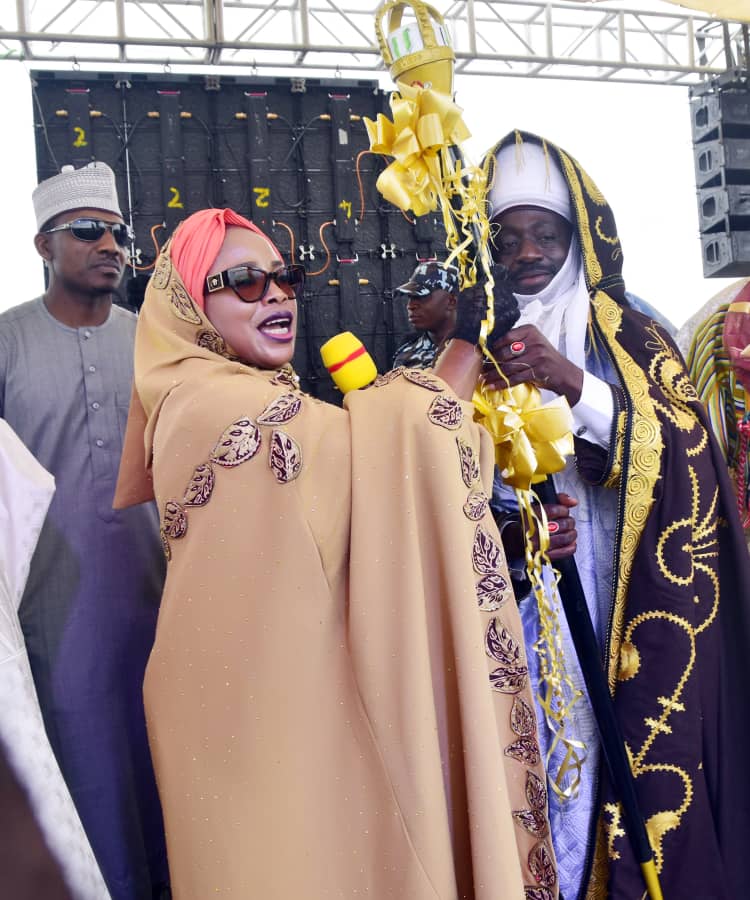
***Canvasses for constitutional role for traditional rulers
The Minister of State for the Federal Capital Territory (FCT), Dr. Ramatu Tijjani Aliyu, on behalf of the FCT Administration, presented the staff of office to Sarkin Bwari, Alhj. Awwal Musa Ijakoro II, who had earlier been crowned by the kingmakers.
A statement issued by her special adviser on Media Austine Elemue quoted the minister to have used the occasion to canvass for continued involvement of the traditional institution in nation-building efforts.
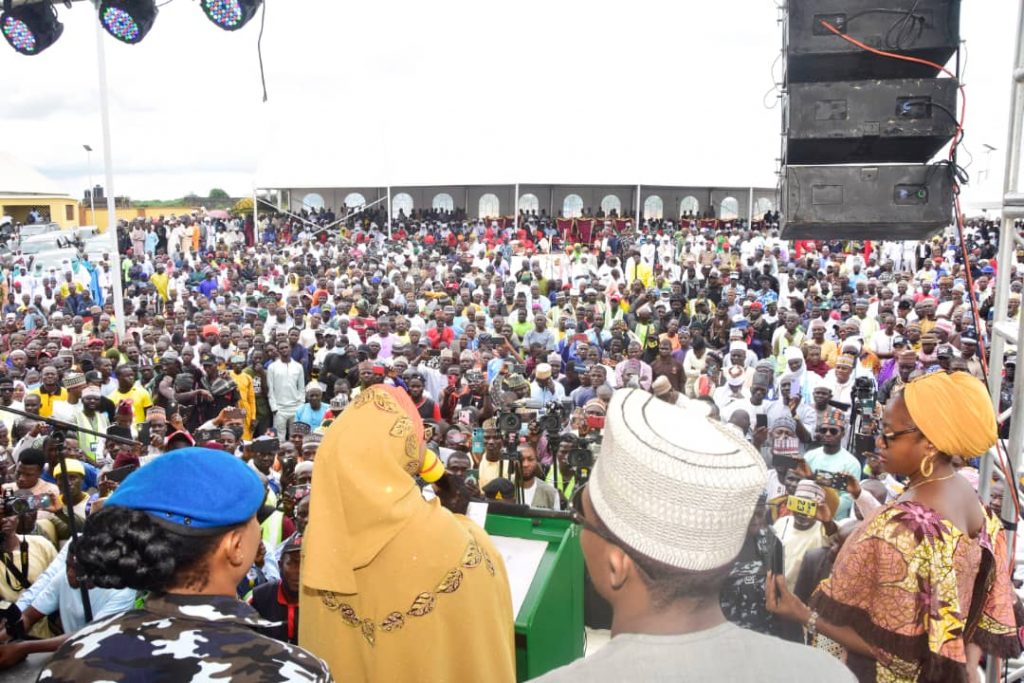
According to her, such roles would create condition for more effective and efficient peace building, and conflict prevention initiatives in Nigeria.
Aliyu disclosed that the crowned Sarkin Bwari is the 5th Sarki who emerged following the demise of his father on the 25th of August 2017, after a successful 41-year reign.
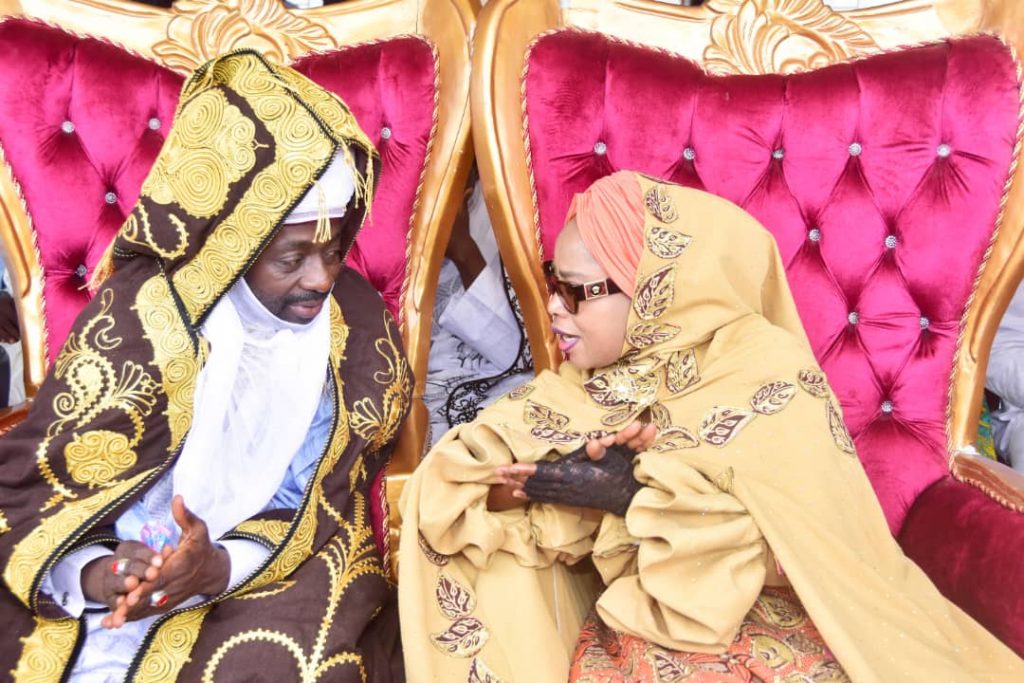
She also pointed out that the FCT Administration had conveyed a letter of appointment to Alhaji Awwal Musa Ijakoro II as a 2nd Class traditional ruler and the 5th Sarkin Bwari, in October 2017.
“Today’s ceremony is to formally present the staff of office to him in continuation of the legacies of his forebears, in the hope that he will provide good leadership, respect constituted authorities and promote harmonious relationships and respect for all tribes and inhabitants of Bwari community and its environs”.
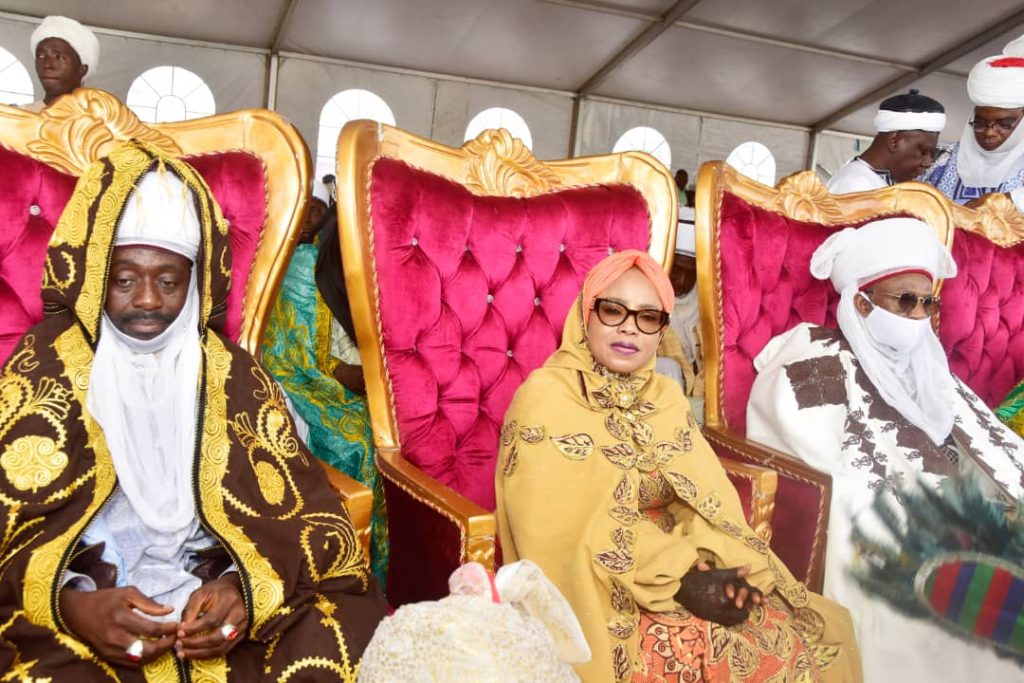
The minister used the occasion to remind graded chiefs and district heads that traditional rulers in both pre-colonial and post-colonial eras contributed immensely to the formation, extension, greatness, and promotion of good relationships among different kingdoms and empires across Nigeria.
Aliyu said; “The traditional institution has brought to bare great cohesion that hav/ sustained the development of political institutions that governed hitherto diverse peoples.
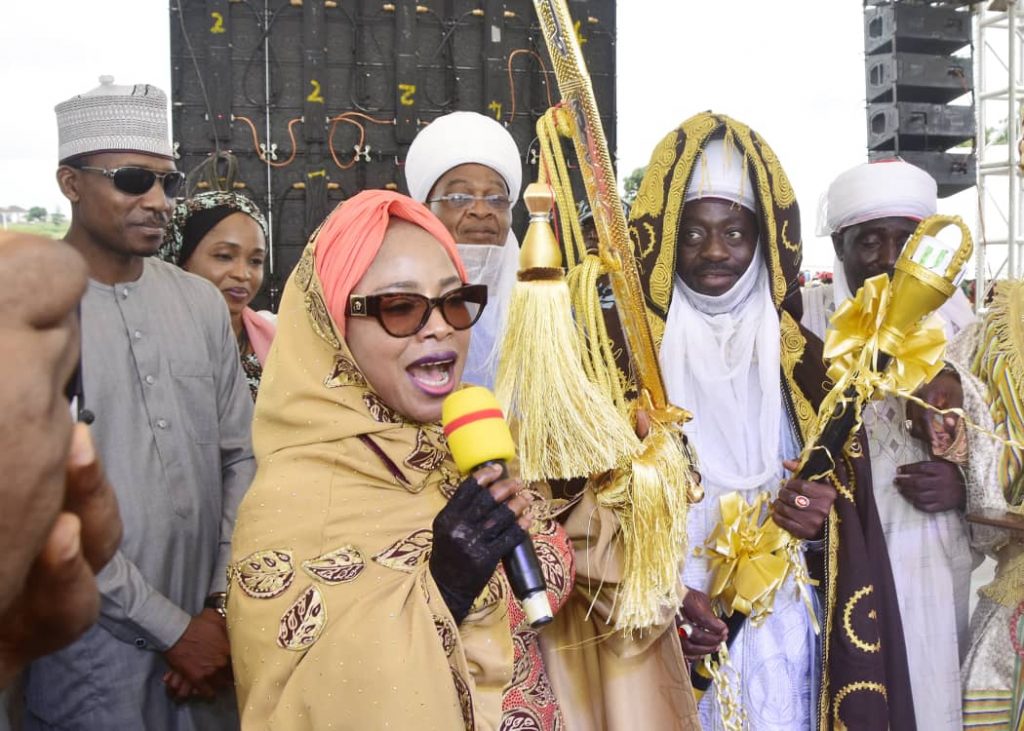
“I want to state unequivocally that with respect to social control, peace and conflict management, there is a strong body of evidence that traditional rulers, though of varied cultures and backgrounds, remain strikingly relevant in our society.
“I, therefore, recommend continued involvement of our traditional institutions in nation-building efforts in ways that would create conditions for more effective and efficient peace building, peace-making and conflict prevention initiatives in Nigeria”.
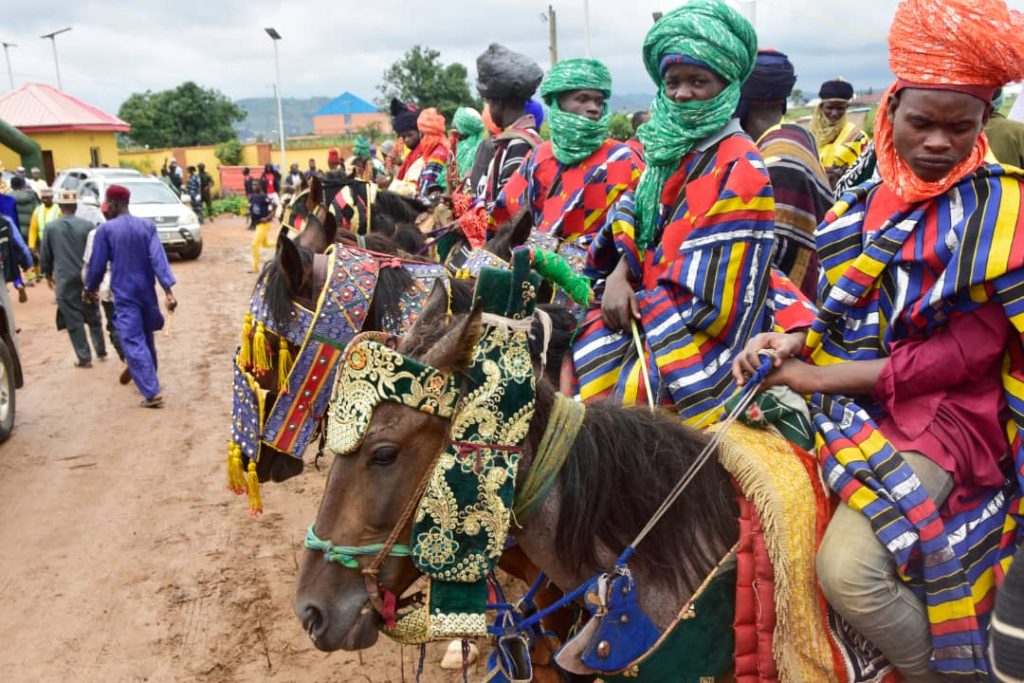
While lamenting that the role of traditional rulers would be limited without constitutionally acknowledging their relevance, she called on the three tiers of government to pass legislations that recognise the country’s traditional rulers as stakeholders and instruments of conflict management and peace building.
She reiterated the assertion that the staff of office was not just a symbol of authority, but also an instrument for promoting peace building and conflict management especially in the face of increasing insecurity in various parts of the country.
The minister warned that the FCT Administration will not spare any traditional ruler that fails to live up to this expectation, by aiding and abetting criminality in his domain.
“It is not in our character, no matter the level of enticement, to betray the trust bestowed on us. As traditional rulers and the custodian of our traditions, this obligation is even more fundamental.
“Indeed, any betrayal of public trust shall stand condemned and will not be acceptable in the seat of Government where President Muhammadu Buhari is the Governor General,” she further warned.
In his remarks, the Mandate Secretary, FCT Area Council Services Secretariat, Hon. Ibrahim Abubakar Dantsoho, described the event as significant in the history of Bwari chiefdom, while charging the new Sarkin Bwari on safety and security of his domain.
He also charged him to work with other traditional rulers in the territory.
He commended the kingmakers of Bwari chiefdom and the chairman of Bwari area council for the peaceful selection process leading to the event.
The occasion was graced by the Sultan of Sokoto, HRM. Muhammadu Sa’ad Abubakar, who was represented by the Etsu Nupe, Alhj. Yahaya Abubakar, Chairman FCT Council of Chiefs and Ona of Abaji, HRM. Adamu Baba Yunusa, and other first class traditional rulers from within and neighbouring states.
Wives of governor of Kebbi, Yobe, and Zamfarai State were also present.
Culture
Lamido Sanusi restored officially as Kano emir
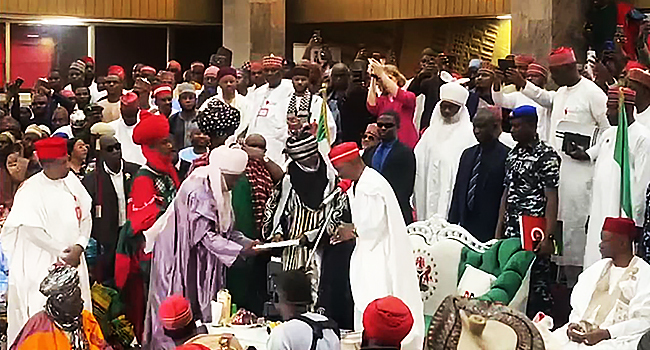
Barely four years after he was deposed by the immediate past Governor of Kano state,Abdullahi Ganduje, Governor Abba Yusuf at the Government House in Kano on Friday issued the letter of appointment to Sanusi Lamido which restored him as Kano Emir.
Governor Yusuf said,
“By the powers conferred on me by the Kano Emirate Council Law of 1984 and 2024, and supported by the recommendation of the kingmakers, I have the singular pleasure to confirm the reappointment of Muhammadu Sanusi II as the Emir of Kano and the head of the Kano Emirate Council,” the governor said.
The governor urged the emir to lead according to Islamic tenets, as he read out his role.
“As the Emir is being appointed for the second time, it is based on his competence, credibility, and popularity,” he said.
“I urge him to be guided by the principles of Islamic teachings and to use his position to unite the emirate, fostering harmony among the Islamic sects in the state.”
Traditional rulers, kingmakers, and other top dignitaries were in attendance at the event which came barely one day after Governor Yusuf signed the Kano State Emirate Council (Repeal) Bill 2024 into law.
The Emir is expected to lead the Juma’at prayer at the Government House.
The new law replaces the Kano State Emirates Council Law, 2019, and dissolves the emirate councils created by Ganduje.
Ganduje had splited⁵ the Kano Emirate into five in December 2019 and deposed Sanusi II, on March 9, 2020. The emirates created by the Ganduje administration were Karaye, Bichi, Rano, and Gaya, in addition to Kano.
Governor Yusuf at the reinstatement event clarified that the 2019 move was a case of victimisation and narrated events leading to his return as emir
“We had a series of meetings with the Kingmakers yesterday, extensive discussions with the Speaker, and we also sat with all the heads of security. At the end of the day, we all gathered in the chamber where I received the bill that repealed the former law,” the governor said.
He continued, “We did that out of our convictions and belief that this gentleman was victimized in 2019. We all feel that we must restore what is due to the good people of the state.”
Governor Yusuf also thanked the legislative body for the accelerated passage of the bill
“Let me use this opportunity to humbly thank the Speaker and all members of the House for your determination and respect for the rule of law. It shows your interest in the welfare of the people of the state,” he said.
Emir Sanusi II, a former governor of the Central Bank of Nigeria (CBN), was known as Lamido Sanusi before becoming king.
His deposition generated controversy in the state and beyond. But in reversing it, Governor Yusuf said it was the repeal of the old law that “balkanised the over 1,000-year- Kano Emirate.”
“From the very moment I signed the bill into law, it means that all appointments made in accordance with that 2019 law are voided, and the balkanised Kano Emirate has been restored to its original pre-2019 status,” the governor said.
“The repeal of the 2019 law means that there is no emir in Kano as of now except the reinstated emir.”
Following the new law, he gave the emirs who were in charge of the dissolved emirates 48 hours to leave their palaces.
Before signing the bill, Governor Yusuf and the speaker of the Kano State Assembly Aminu Abdussalam had met with traditional rulers and kingmakers behind closed doors.
Sanusi II started his reign on June 8, 2014, when Rabiu Kwankwaso was the governor of Kano State. His appointment came about four months after Goodluck Jonathan – the then-president – removed him as the governor of the CBN.
Culture
Minister Musawa commemorates World Culture Day, says, ‘our strength is in our diversity’
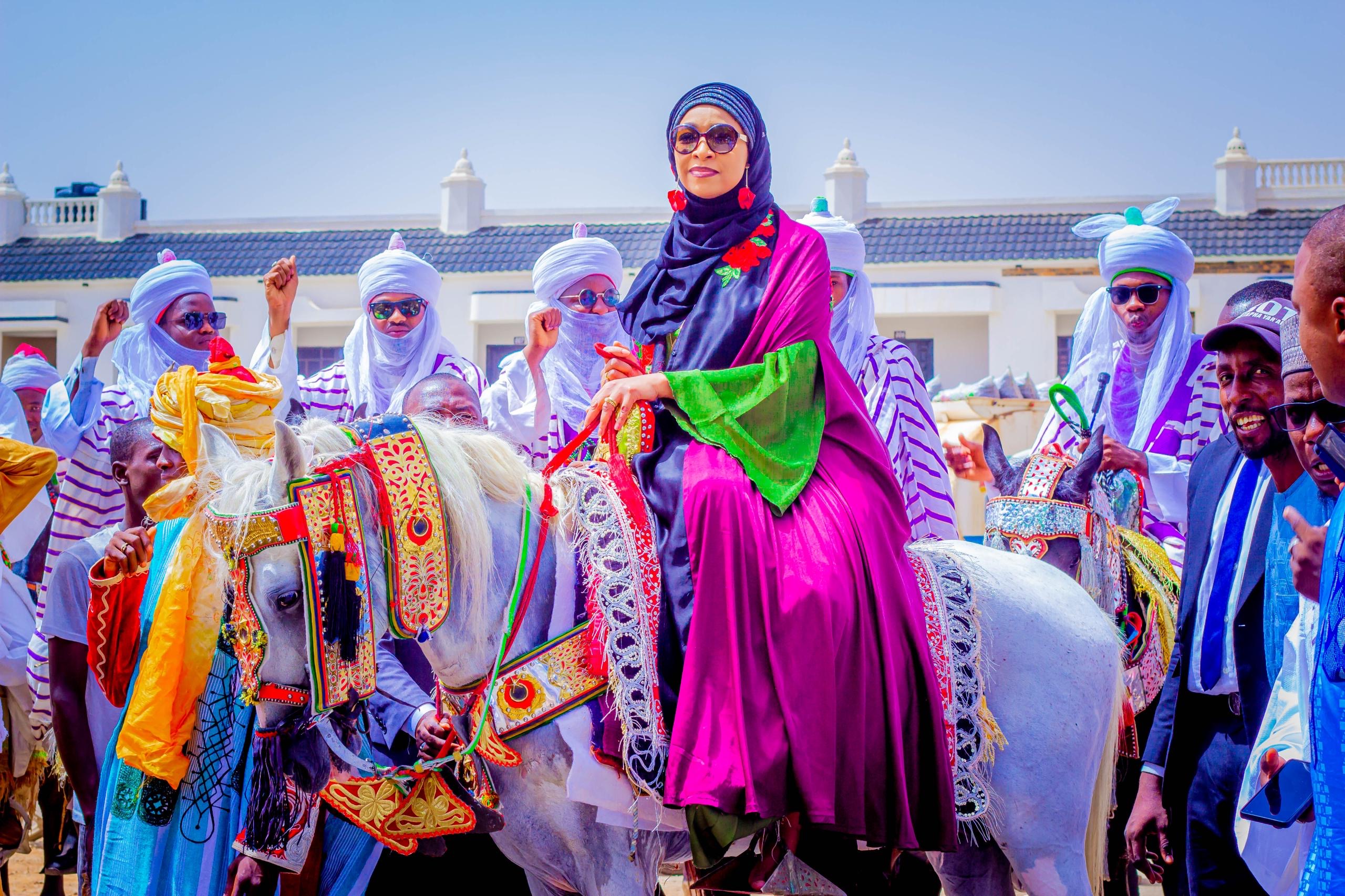
Nigerians should celebrate the country’s cultural diversity, because it the nation’s source of strength and unity, the Minister of Arts and Culture , Barrister Hannatu Musa Musawa has advocated
In her address to commemorate the 2024 World Day for Cultural Diversity for Dialogue and Development (World Culture Day), M
Musawa emphasized the need to appreciate and promote Nigeria’s diverse cultural heritage.
A statement by her special adviser on media and publicity, Nneka Ikem Anibeze, she urged Nigerians to take pride in their culture and recognize its potential to drive economic development, social and mental wellbeing, and national unity.
The Minister noted that the country’s plurality of culture and ethnicity should be leveraged to promote dialogue, understanding, and peaceful coexistence, rather than allowing differences to divide us. She encouraged Nigerians to see their diversity as a source of strength and unity, rather than a source of conflict.
“The World Culture Day is an opportunity to remind and help us to understand the value of cultural diversity and the vital role it plays in ensuring peaceful co-existence as a vital tool for socio-economic growth and development.
“It is a day for deep reflection on where we are as a nation. Taking into cognizance that our dear country is characterized by plurality of culture and ethnicity, it behooves on us to change the narrative on people who are culturally, ethnically and religiously different from us, in order to curb terrorism, kidnapping and banditry and other negative vices as we forge ahead as one people with a common goal”.
She also announced that the Ministry will continue to work tirelessly with its agencies and stakeholders to promote Nigeria’s creative economy and boost the nation’s image, in line with its Eight-point Plan to make Nigeria ,Africa’s Creative Capital by 2030.
“I wish to assure you that the Federal Ministry of Arts, Culture and the Creative Economy, in line with its Mandate to harness the potentials of Nigeria’s Creative Economy for socio-economic empowerment, economic diversification and job creation, will continue to work tirelessly with our Agencies and relevant stakeholders to boost the image of Nigeria and improve the lives of our people through the Ministry’s Eight-point Plan for Nigeria’s destination 2030 to become Africa’s Creative Capital.
“I call on all Nigerians to present our culture with with deep pride and appreciation and encourage us to continue to see our diversity as our source of strength and unity from which we can build a progressive nation for us all”.
The World Day for Cultural Diversity for Dialogue and Development (World Culture Day) is a day set aside by United Nations Educational, Scientific and Cultural Organization (UNESCO) on May 21st every year to raise awareness on the role of Culture in sustainable socio-economic growth and development.
Culture
Culture Ministry secures UNESCO Inscription for Sango Festival, Midwifery traditions

According to Musawa, the achievement was made possible through the Ministry’s tireless efforts and strategic collaborations at the national and international levels, in line with the 2003 UNESCO Convention for the Safeguarding of the Intangible Cultural Heritage.
“The UNESCO Representative List of the Intangible Cultural Heritage of Humanity, plays a crucial role in safeguarding and promoting cultural diversity worldwide. It helps in raising the awareness about the significance of Intangible Cultural Heritage, encourages dialogue between communities, fosters respect for cultural expressions and promotes sustainable development by preserving traditional knowledge and practices.
“The inclusion of these two Nigerian cultural elements on the Representative List of the Intangible Cultural Heritage of Humanity has transformed them into shared global heritage (products) with enhanced visibility. The 181 States; Parties to the 2003 UNESCO Convention for Safeguarding of the Intangible Cultural Heritage are predisposed to visiting Nigeria to enjoy these cultural expressions.
“The anticipated increase in tourism inflow into the country, will result in global visibility, job creation and wealth generation , thereby contributing to sustainable national growth and development, economic well-being and pride in national cultural identity”.
The two key products from Nigeria were inscribed on the UNESCO representative list of intangible cultural heritage of humanity during the 18th Session of the Inter-Governmental Committee for the Safeguarding of Intangible Cultural Heritage in Kasane Botswana from 4th to 9th December 2023.
The Sango Festival and Midwifery traditions have now been recognized as integral parts of human cultural heritage, joining five previous Nigerian inscriptions: Ifa Divination System (2008), Oral Heritage of Gelede (2008), Ijele Masquerade (2009), Argungu International Fishing and Cultural Festival (2016), and Kwagh-hir Theatrical Performance (2019).
This milestone not only promotes cultural diversity and community cohesion but also contributes to sustainable development, job creation, and wealth generation through increased tourism. It aligns with the renewed hope agenda of President Bola Ahmed Tinubu’s administration, which prioritizes the appreciation and preservation of Nigeria’s rich cultural heritage.
The Minister of Arts Culture and the Creative Economy Barrister Hannatu Musa Musawa has announced the Ministry’s achievement in pushing for UNESCO’s inscription of Sango festival Oyo and the multinational nominating of Midwifery: knowledge skills and practices.
A statement by her special adviser on media Nneka Nkem Anibeze quoted the minister to have spoken at the Federal Executive Council Meeting, presided over by President Bola Ahmed Tinubu on Monday, while briefing the Council on the strategic activities of the ministry since its establishment in August 2023.

-

 Crime1 year ago
Crime1 year agoPolice nabs Killer of Varsity Lecturer in Niger
-

 News1 year ago
News1 year agoFCT-IRS tells socialite Aisha Achimugu not to forget to file her annual returns
-

 Appointment2 years ago
Appointment2 years agoTinubu names El-Rufai, Tope Fasua, others in New appointments
-

 News From Kogi1 year ago
News From Kogi1 year agoINEC cancells election in 67 polling units in Ogori-Magongo in Kogi
-

 News From Kogi2 years ago
News From Kogi2 years agoEchocho Challenges Tribunal Judgment ordering rerun in 94 polling units
-

 News2 years ago
News2 years agoIPOB: Simon Ekpa gives reason for seperatists clamour for Biafra
-

 Metro1 year ago
Metro1 year ago‘Listing Simon Ekpa among wanted persons by Nigeria military is rascality, intimidation’
-

 News1 year ago
News1 year agoKingmakers of Igu/ Koton-Karfe dare Bello, urge him to reverse deposition of Ohimege-Igu
